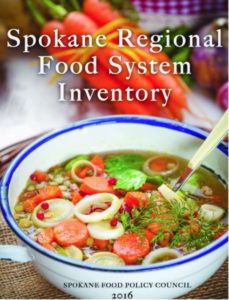By Kendra Dean, Catholic Charities Eastern Washington Food For All Project Manager
There are a multitude of reasons to support your local farmers markets here in Spokane County. These include, but are not limited to, enhanced flavor, building your local community, reducing your environmental impact, and supporting local businesses – all great things!
We are very fortunate to have nine farmers markets in Spokane County from May through October. We are also very fortunate to have great programs that help to increase the buying power of low-income families and individuals at farmers markets. These programs can often be overwhelming to learn about, as there are different kinds of currencies that can be used on different types of items. Therefore, each program will be described below.
The Supplemental Nutrition Assistance Program (SNAP) provides many individuals and families with nutrition assistance dollars (also known as Electronic Benefit Transfer – EBT) to spend on food items. This program helps low-income families to stretch their food dollars and increase 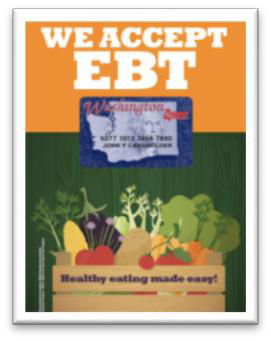 their food security. In Spokane County, there are over 88,000 clients who receive SNAP assistance. Most farmers markets in Spokane County accept EBT dollars. SNAP customers can convert their EBT dollars into tokens that can be used to purchase the same food items that can be purchased in the grocery stores, such as produce, meat, cheese, eggs, and more.
their food security. In Spokane County, there are over 88,000 clients who receive SNAP assistance. Most farmers markets in Spokane County accept EBT dollars. SNAP customers can convert their EBT dollars into tokens that can be used to purchase the same food items that can be purchased in the grocery stores, such as produce, meat, cheese, eggs, and more.
In addition, Fresh Bucks is an incentive program for shoppers utilizing their EBT card. For every
$5 shoppers spend on their EBT card, they receive an additional $2 to spend on fresh fruits, vegetables, mushrooms, and plant starts. No change is given for this currency.
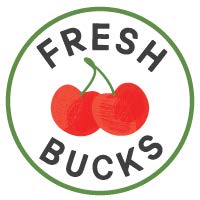
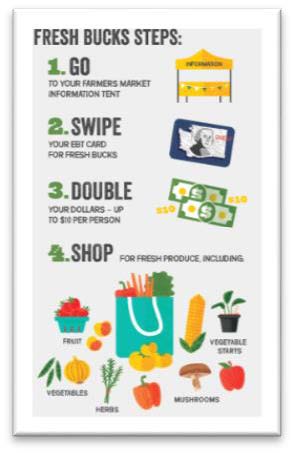
In Spokane, the EBT and Fresh Bucks programs have continued to grow each year. In 2017, Spokane Farmers Markets had over $49,000 in EBT sales and over $16,000 were distributed in Fresh Bucks, which was a 40% increase in sales from 2016.
Kids Eating Right – Nutrition and Exercise for Life (KERNEL) is a free kids activity at seven markets in the county – Emerson Garfield, Fairwood, Hillyard, Kendall Yards, Thursday, Spokane, and Millwood. KERNEL introduces children to healthy living and eating habits through simple weekly activities at local farmers markets. In exchange for their time and participation, children receive a $2 voucher, aka, KERNEL cash, that they can use to purchase fresh produce or plant starts at the farmers market. Allowing kids to purchase market produce with their KERNEL cash gives them experience participating in commerce and exchange, allows them to develop communication skills as they purchase food, and reinforces the idea of supporting local farmers and communities.
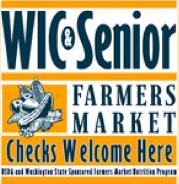 The Farmers Market Nutrition Program (FMNP)
The Farmers Market Nutrition Program (FMNP)
The FMNP program is available for Women, Infants, and Children (WIC) clients, as well as low- income seniors. The WIC program supports low-income pregnant women, post-partum women, and infants and children up to 5 years of age with supplemental food, healthcare and nutrition education. The WIC FMNP program was established in 1992 to help increase access to local produce and expand the awareness of farmers markets. WIC FMNP clients receive $20 in checks to spend at the farmers market on fresh fruits, vegetables, and plant starts. (https://www.fns.usda.gov/fmnp/overview).
Senior FMNP improves the nutritional health of low-income seniors by providing them with $40 in vouchers that can be used to purchase fresh fruits, vegetables and from certified farmers markets. Recipients must meet age, income and residency criteria to be eligible to participate.
What does this have to do with Food Policy?
These programs are all supported with federal dollars through SNAP-Ed and FMNP. The funding for both of these programs is voted on by Congress each year, and distributed to the states. The FMNP federal funding covers all of the food costs, as well as 70 percent of the administrative costs. The SNAP-Ed program is funded through the Nutrition Education and Obesity Prevention Grant Program in the Healthy, Hunger-Free Kids Act of 2010. These are both important programs that help to increase access to fresh, local produce, while also helping to support local farmers.
 |
|
 |
